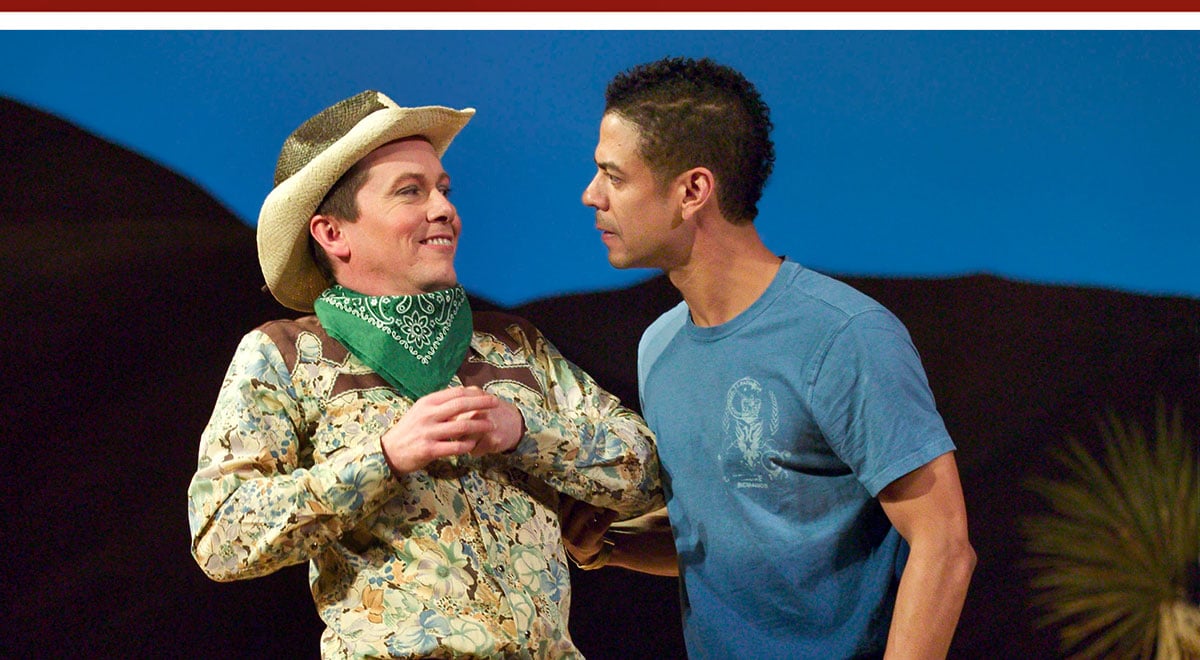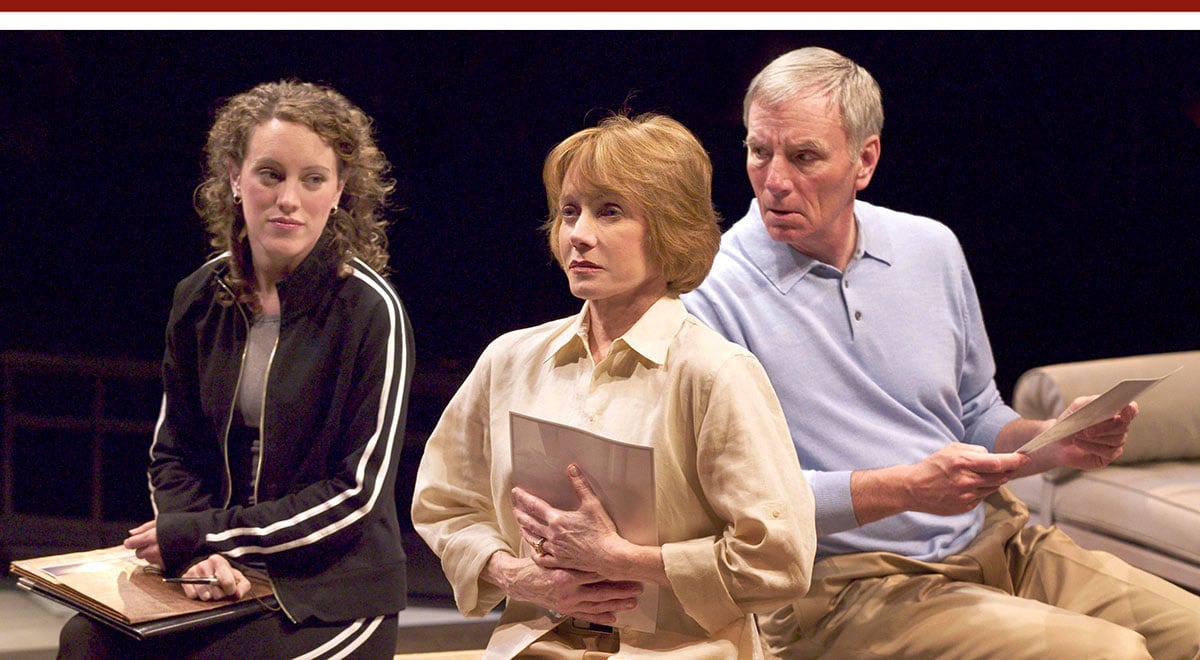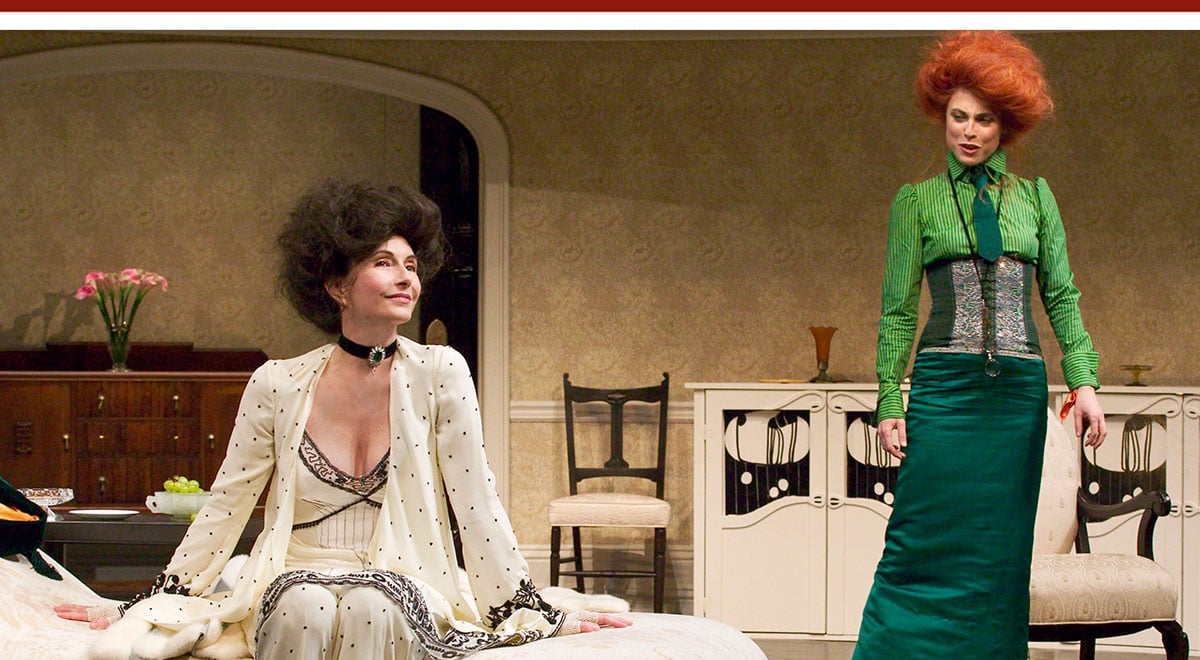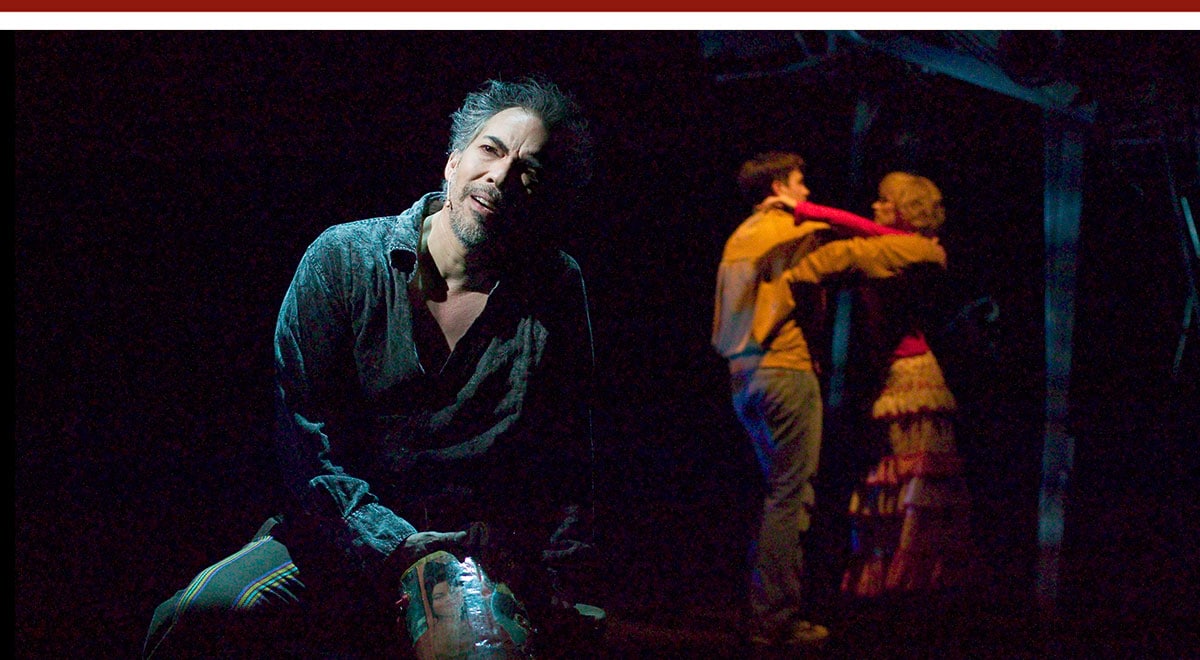MARCH 2006
Click title to jump to review
AS YOU LIKE IT by William Shakespeare, adapted by Allison Carey | Cornerstone Theatre Company / Pasadena Playhouse
BODY OF WATER by Lee Blessing | The Old Globe
BOSTON MARRIAGE by David Mamet | Geffen Playhouse
MAN FROM NEBRASKA by Tracy Letts | South Coast Repertory
THE TIMES THEY ARE A-CHANGIN' by Bob Dylan and Twyla Tharp | The Old Globe

Vowing change
Shakespeare’s As You Like It has been taken up by the good folks at the Cornerstone Theater Company in time to celebrate the talents of departing co-founder Bill Rauch, who directs, remind of the talents of remaining co-founder Alison Carey, who adapts, and characterize the state of marriage law to be not as they like it.
The production, at the Pasadena Playhouse through April 16, takes inspiration from Shakespeare’s gender- disguising plot line and final group marriage and creates a contemporary "California concoction" where people get to marry the person they fall in love with. End of story.
Carey does this with a cleverly updated script that feels as if Shakespeare wrote it himself last year in San Marino. Local politics, radio personalities and landmarks help tie down this circus tent of ingenuity and set the stage for a career-defining performance by Christopher Liam Moore as Rosalind. Moore brings revelatory heart and intelligence to this role. In the opening scenes, set in Pasadena after the “mayor” has been displaced by his brother, he weights the man-in-drag site gag with the woman-in-love pathos. When the action shifts not to Arden but to Lynn Jeffries' playful Mojave desert diorama, Rosalind adopts the persona of "Loverboy, " a rouged Woody from Toy Story.
Chief among Moore's aides-de-camp are Leith Burke as Orlando, Peter Howard as Jacques and the chameleonic Kate Mulligan, who gets to show off her singing talents. (Add this to her recent multi-role performance in The Further Adventures of Hedda Gabler, and the LADCC would be well served to consider a special award for Best Ensemble Performances by a Single Actor.) The characters are now contemporaries, decked out in Chris Acebo's couture. Touchstone (Jonathon del Arco) is a comic, Charles (Mulligan) is a Moto-Cross star, and Jacques is a former TV producer suffering depression. Carey gives him a "televised" seven stages of man speech, now arcing from cartoons to cancellation, including an old age that is “dependant on the remote.”
Rauch stakes his claim to the success, too. His actors can flutter around for comic value, then drop anchor on a dramatic dime. The blocking is easy on the eye and continually forming stage pictures that fill the space with interesting composition.
Love is manifest as an inalienable right that strikes without concern for civic codes and power grids. Its onset is a rosy glow that pulses around the smitten couple like neon spill from the red-light district. It is as instant and insurmountable as Titania’s spell. And, in the end, imbued with this love and aided by a "deus ex Martia," Rosalind screws her courage to the sticking place and insists that everybody on stage and off soon be allowed whatever wedded bliss they like. In the climactic unmasking, Loverboy is not merely revealed as Rosalind, but Rosalind is revealed as Moore. Rather than returning to the wig et al that made him a convincing woman, Moore is clearly a man and we have stepped into that rarefied zone where theater and reality meld. It sets up a Carey-created epilogue that Moore delivers as a personal statement.
It was much to the liking of the industry crowd on opening night. We'd like it even more if the regular audiences prove to be just as smitten.
top of page
AS YOU LIKE IT
by WILLIAM SHAKESPEARE
adapted by ALISON CAREY
directed by BILL RAUCH
PASADENA PLAYHOUSE
thru April 16, 2006
CAST Christian Barillas, Leith Burke, Benajah Cobb, Gregory Cruz, Jonathan del Arco, Gerald Hiken, Peter Howard, Dorothy James, Page Leong, Christopher Liam Moore, Kate Mulligan, Scott Rodarte, Lisa Tharps, Bahni Turpin
PRODUCTION Lynn Jeffries, set; Christopher Acebo, costumes; Geoff Korf, lights; Benajah Cobb, sound; Shishir Kurup, music
Mixed Blessing
Lee Blessing’s A Body of Water, at the Globe’s Cassius Carter through March 19, sounds the echoless depths of the human mind in a daring work with special resonance for families with dementia patients. Stark and profound, it will be endlessly fascinating or endlessly frustrating depending on what audiences bring to it.
Reminiscent of the computer game Myst, in which players are set in an abandoned island compound to sort out what happened, Body begins with actors and audience equally adrift. Large floating windows rise along the stage's four sides for a sense that we are all descending through Michael Roth’s atmospheric music onto Michael Vaugh Sims’ simple game-piece set. An immaculate sixtysomething couple (Sandy Duncan and Ned Schmidtke) sip morning coffee as they gradually share their utter bewilderment: they do not know one another or where they are. They do not even know their own names. Despite their sophistication, they are as helpless as tropical fish.
Blessing and Director Ethan McSweeny spend enough time in this confused state to explore how certain people might behave when, despite high intelligence, they are stripped of their identity. These two, while naturally somewhat suspicious and anxious, maintain their poise, humor and concern for each other. After they search in vain for clues, they are joined by a younger woman named Wren (Samantha Soule). While she clearly does not suffer their condition, Wren has her own issues and metes out bits of information to the fact-starved older couple as if chumming for an epiphany or apology. Details of what happens could only serve to puncture the delicately crafted bubble that the action seeks to suspend.
McSweeny has elicited exciting portrayals of calm at the edge of reason as well as crack creative work from his designers. Duncan, Schmidtke and Soule are all excellent. Soule – in probably the hardest role – takes some warming up to, but by Act II her odd Act I behavior is justified. Sims' wonderfully clean platform set floats in the Cassius Carter, surrounded by pools of water. Sims, McSweeny and Roth team to create one unforgettable sequence. Between two Act II scenes, the windows descend into the pools of water instead of making their usual ascent into the rigging. When the panes are pulled up to haunting piano accompaniment, the perforated troughs along the bottoms create sheets of rain. It's a powerful and ominous image that the entire stage is being lifted out of the lake.
As the name suggests, A Body of Water is constantly shifting and not for those who need a firm foundation. But it is capable of providing a myriad of brilliant reflection.
top of page
A BODY OF WATER
by LEE BLESSING
directed by ETHAN McSWEENY
OLD GLOBE THEATRE
through March 19, 2006
CAST Sandy Duncan, Ned Schmidtke and Samantha Soule
PRODUCTION Michael Vaughn Sims, set; Charlotte Devaux, costumes; York Kennedy, lights; Michael Roth, original music
Samantha Soule, Sandy Duncan and Ned Schmidtke
Craig Schwartz
From the mouths of babes
The double entry that renovation has given the Geffen Playhouse leads to a houseful of double entendre, through March 19, thanks to David Mamet’s Boston Marriage. "Boston Marriage," antique code for a lesbian household, is not set in such a home, although head of household Anna (Mary Steenburgen) wishes the place settings were thus.
It is instead a loveless locale where Anna keeps herself in sweetmeats by holding fast the affections of a wealthy philanderer and keeps tenuous hold on her sanity by engaging in mental jousting with her younger friend Claire (Rebecca Pidgeon). The wordplay in the drawing room is poor substitute for preferred interplay elsewhere, and grows more heated as it becomes clear that Claire is now interested in younger game. To further rub Anna the wrong way, Claire has come to requisition the home for her play station.
But sexual identity is hardly the point here. Any more than it was in The Importance of Being Earnest, where not surprisingly Oscar Wilde fashioned men who seemed more engaged by one another than the women they fawned over. Boston Marriage is in fact a fun-house inversion of Earnest’s first scene, before the women arrive. Especially with dialogue like Anna's remark, when after setting up audience empathy for where her need to now "perform the most unpleasant of tasks" she goes Wildean: "To pack when rushed."
Like Wilde there, Mamet here engages in a frolicsome mixture of bitchy zingers and some serious woes about aging. Mixing pathos with pleasure, for instance, when a beleagured Anna opines, "Oh, how the lesser beasts draw strength by the sight of the lioness beset. . . .[Several beats.] There's confusion at the water hole. "
Mamet, who has a knack for wonderfully intricate plots, uncoils one of his simpler ones for Boston Marriage. It's no more than what is necessary for him to send his voice through three beautiful women of varying generation. By jumping to all female characters and scrambling their sexualities, he covers his vocal tracks.
As the lead, Steenburgen delivers her role with ease. More than one bit of word-salad was chewed as her motor got purring this Saturday afternoon, but she was soon beautifully walking Mamet’s balance beam between sarcasm and sentiment.
Saddled with the show's true clown role, complete with sight gags, Alicia Silverstone holds her own. She earns her laughs as the simple-minded maid who despite her lack of education rarely misses the meaning of what the others hurl at her. In her primitive naive state, she's able to attain gratification, whether at the hands of a rustic in the park across the street, or by entertaining vague overtures from her boss.
And, ah, Ms. Pidgeon. I feel as Stephen Colbert’s neo-persona does about Bush. My head loves her but my gut says something’s wrong. There’s an ineffable sameness to her performances here and in her films (Winslow Boy and Spanish Prisoner for two random examples). Her characters always come across as brainy, independent, compelling and very attractive. But her delivery has a patterned quality, her gaze a steadiness that feels constricted. It’s obviously a choice, since there's no evidence of this in her singing. A handful of pop and jazz records reveal her ability to be warm and flexible. Given her closeness to and casting frequency with this playwright/director, she must be nailing something.
No double entendre intended.
top of page
BOSTON MARRIAGE
written and directed by
DAVID MAMET
GEFFEN PLAYHOUSE
through March 19
CAST Rebecca Pidgeon, Alicia Silverstone, Mary Steenburgen
PRODUCTION Takeshi Kata, sets; Debra McGuire, costumes; Lap-Chi Chu, lights
Troubled state
A fog engulfs the man in Tracy Letts’ Man from Nebraska, receiving its West Coast premiere at South Coast Repertory through April 2. Having spent his life comfortably insulated by Middle American geography and values, at mid-life all that protection now clouds his thoughts and literally chokes him. It has even drawn a cloak across an otherwise starry night sky.
Ostensibly writing about a man’s relationship with God, Letts instead invests more storytelling concerns into this man’s relationship with people. It starts with his wife, in an opening montage of silent, disquieting scenes, pushed to straining level by the patient pacing of director William Friedkin. As Ken (Brian Kerwin) and Nancy Carpenter (Kathy Baker) finish a typical day in Lincoln, Nebraska, he acknowledges a sudden crisis of faith. Although it sounds like a handy wedge to distance, an explosion of pent-up anger soon drives the wedge deep enough to separate the couple. At the suggestion of his pastor (Ben Livingston), Ken embarks on a solo voyage of self-discovery in London, where he was once stationed in the Air Force. His round-trip is the play's trajectory, and whether he survives his re-entry can be left to the viewer.
Admirably, Letts has given himself the challenge of creating a central character who is not admirable, and even less articulate. Unfortunately driving with a silent partner like Ken -- so cut off that he is dull and uncaring -- can seem like a long journey. He easily puts more distance between himself and his wife, his dying mother (Jane A. Johnstone) and his daughter (Susannah Schulman). He has no friends. It’s a role that has no flash, no fiery speeches, and only modest rewards. However, the cast is able to express the pathos and still land the occasional humorous bit. And, thankfully Kerwin is a master of the internalized tension as he displayed in Warner Shook’s excellent workout of The Goat at the Taper last year. Baker, too, must play most of the show in restraints and manages to show Nancy’s breaking heart without wearing it on her sleeve.
England seems to be Letts’s cure. But Ken's inclination is to insulate himself here, too. He strays from his Sheraton hotel room only as far as the hotel lounge, where he can wile away the evenings making friends with Tamyra (Susan Dalian), a beautiful black butterfly who only stays because she is pinned to the bar by her job. She befriends Ken, introducing him to her boyfriend Harry Brown (Julian Stone), a sculptor who encourages the directionless guest to try moulding something.
Friedkin edges the cultural divide in England's favor by underscoring American scenes with television audio and England with good jazz. In America, people stare at television and have less to say; in England conversation flourishes. But this doesn't help clarify the script's underlying storytelling divide: Are we on about man's individual faith or fate? Or, have we switched to questions about the fatherland versus mother England?
In the end, fate forces Ken back to Nebraska. A death in the family is required for him to make a move home. Without it, he might still be up to his wrists in shapeless clay. Still unassertive, but forced into action, he is able to make choices. In making the right ones, he gains convictions if not confirmations, and the fog begins to lift. As it does, the clearing reveals starlight again. But it also reveals the damage Ken has caused by weeks of crashing around in the dark. Things are broken that may never be repaired.
Whether the people he has hurt and ignored can see things his way is open to debate. Whether Letts has given his audiences enough hooks upon which to hang some genuine concerns for this son of a Carpenter is another question.
top of page
MAN FROM NEBRASKA
by TRACY LETTS
directed by WILLIAM FRIEDKIN
SOUTH COAST REPERTORY
through April 2
CAST Kathy Baker, Susan Dalian, Jane A Johnstone, Brian Kerwin, Hal Landon Jr., Ben Livingston, Laura Niemi, Susannah Schulman, Julian Stone
PRODUCTION Chris Barreca, sets; Nephelie Andonyadis, costumes; Lonnie Rafael Alcarez, lighting; Drew Dalzell, sound
Brian Kerwin, Susan Dalian (Ken Howard), top; and inset Kerwin and Kathy Baker (Cristofer Gross)
Midway Attraction
The Globe is engulfed by a brilliant corona. The excitement surrounding The Times They Are A-Changin’, the new Twyla Tharp musical of Bob Dylan songs, has made the San Diego complex the current star of the American theater, heating up enough interest the world over to warrant two extensions prior to opening. But we found, at least at this stage, its core remains in a gaseous state.
It’s unclear whether Times was to serve the songwriter or the choreographer. But at this point, without much apparent imagination going into the drama, dance, set or arrangements, it may only serve the cynics who suggest it seeks to repeat Tharp’s success with Movin’ On, her still-touring Billy Joel dance musical from a few years ago. Still, the audience seemed sated, and at curtain call generated about a quarter-house standing ovation.
Less than 90 minutes earlier we had awaited the show by reading a drape that concealed the stage. It was held in several spots as if by tent poles. Written on it were lyrics and instructional phrases like "Thinking of a Series of Dreams," "Thought Dreams Could Be Seen," "Where the Time and Tempo Fly." As the houselights dimmed and the first colors of designer Don Holder’s lighting palette warmed Santo Loquasto’s set, a young man emerged from behind the drape. He surveyed the older audience and began to sing a youth's warning: "Don’t criticize what you can’t understand." He’s a little startled when joined by a strummed guitar chord, but quickly embraces the accompaniment and forges ahead, his voice growing stronger as he gains confidence in his thoughts, his words, his performance, and their ability to engage an audience. It’s a beautiful moment of testimony to the creative process, the spirit of defiance, and the beauty of a torch carefully passing from one generation to the next.
It unleashes a torrent of emotional applause as we sense we’re on the verge of an experience that takes us somewhere new while again bringing home the notion that the more things change the more they really stay the same.
Unfortunately, when the drape then drops, so does the hope for a coherent story. We fall deep into carnival territory. The young singer, Coyote (Doug Kreeger in for Michael Arden), jockeys for power with his abusive Ringmaster/Barker father, Captain Arab (Thom Sesma), whose nether-circus features the midway-brightening midriff of Cleo (Jenn Colella, with more costumes than key changes). For her pain and understanding, Cleo is promptly drop-kicked off the lot. These three along with a half-dozen amazingly athletic dancers, all distressed in Mad Max style, explore the shadows of the "Life is a Carnival" concept in a bookless musical of nearly 30 songs that roughly follows the good son’s overtaking the bad father.
The set is open for dancing, with two stage-wide runs of embedded trampolines and an upstage wall as dark as night. Stage right is the Captain’s decal-ridden caravan. Stage left is the five-piece band’s platform, festooned with junkyard items and high enough to allow people to pass beneath. The drape is occasionally redrawn and some rolling screens break up the space. Perhaps, assuming that the dancing would provide enough imagery to fill the stage, the designers opted to keep the stage spare. But, since the main character’s strongest moments are sung sans danse, they may be mistaken. In addition to Coyote’s opening song, Cleo delivers "Don’t Think Twice" as she leaves the Captain, and he later gives "Desolation Row" in a great rendering. The creators do not use projections, though they may want to rethink that given that one of the more interesting moments is the appearance of a projected shadow of death on the back of "Mr. Tamborine Man."
What might improve things? Hard to say. Given the real paucity of exciting dance, perhaps they could move the band onto the stage, dress them in rags and let the musicians add some performance excitement. Or go halfway and put them behind a scrim that can go opaque when the story doesn't justify a sideshow band. The whole opportunity to really freak this up seems lost. A Dylan world without the sideshow freaks – even if only in illustrations on those traveling screens – feels pretty tame. Instead, we have a cuddly "Man Gave Names to the Animals" sequence, which seems a waste unless there's hope to spin off a PBS Kids show. And while the performers are all very good, one wonders if there aren't three theatrical rockers of the old Tim Curry stature (like when he recorded his rock albums) with larger-than-life personae to give these archetypes both playfulness and threat.
Dylan’s poetry always gave his songs a feeling of heft and importance, even when there wasn’t any. And there’s a point at which, admittedly, we just need let it go: let the music be free to go wherever it might. Still, a bunch of dancers bouncing around with large black rubber balls across the stage to "Like a Rolling Stone?" Seems a fatal twist of simplicity for a song as socially significant as this one.
top of page
THE TIMES THEY ARE A-CHANGIN'
Conceived and directed by TWYLA THARP
music and lyrics by BOB DYLAN
OLD GLOBE THEATRE
January 25-March 19, 2006
CAST Doug Kreeger (usually Michael Arden), Thom Sesma, Jenn Colella, Marty Lawson (usually Charlie Neshyba-Hodges), Jason McDole, Jonathan Nosan, Justin Bohon, Albert Guerzon, Sean Stewart, Tamara Levinson
PRODUCTION Santo Loquasto, set and costumes; Donald Holder, lights; Francois Bergeron, sound; Henry Aronson, musical direction
HISTORY World Premiere





